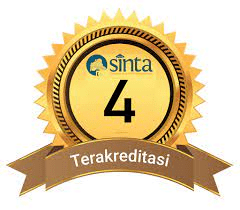Pengaruh Skema Pemberian Insentif dan Reputasi terhadap Budgetary Slack (Eksperimen di Masa Pandemi)
Abstract
Keywords
Full Text:
PDFReferences
Brahmayanti, S. dan Sholihin, M. (2006). Pengaruh Reputasi Dalam Hubungan Antara Asimetris Informasi Dengan Senjangan Anggaran Di Bawah Metode Kompensasi Truth Inducing. Jurnal Ekonomi dan Bisnis Indonesia, 21(2), 175-185.
Candra, M., dan Helmayunita, N. (2019). Pengaruh Skema Kompensasi dan Self Efficacy Terhadap Budgetary Slack: sebuah studi eksperimen. Jurnal Eksplorasi Akuntansi, 1(3), 906-921.
Charles, J., dan Handoko, J. (2021). Pengaruh Reputasi dan Tanggung Jawab Personal Terhadap Budgetary Slack. Jurnal Akuntansi Bisnis, 14(2), 82-93.
Chow, C. W., Cooper, J. C., dan Haddad, K. (1991). The Effects of Pay Schemes and Ratchets on Budgetary Slack and Performance: A Multiperiod Experiment. Accounting, Organizations and Society, 16(1), 47–60.
Efrilna, P. (2018). Pengaruh Skema Pemberian Insentif dan Tanggung Jawab Personal Terhadap Budgetary Slack. Jurnal Akuntansi, 6(1), 1-21.
Firmansyah, R., Rosidi., & Ghofar, A. (2017). The Effect of Attribution Theory to The Budgetary Slack. Imperial Journal of interdisciplinary research, 3(3), 364-375.
Hanggraeni, D. (2012). Manajemen Sumber Daya Manusia. Jakarta: Lembaga Penerbit Fakultas Ekonomi Universitas Indonesia
Hansen, D. dan Mowen, M. (2016). Akuntansi Manajerial, (edisi ke-8), Buku 1. Jakarta: Salemba Empat.
Harsanti, N., dan Nazaruddin, L. (2021). Pengaruh Asimetris Informasi, Karakter Personal, Reputasi, Trust in Superior dan Mutual Monitoring Terhadap Budgetary Slack. Jurnal Kajian Akuntansi dan Auditing, 16(1), 1-14.
Indonesian Corruption Watch. (2020). Tren Penindakan Kasus Korupsi 2020. Didapatkan dari https://www.antikorupsi.org/id/article/tren-penindakan-kasus-korupsi-tahun-2020
Nugrahani, T. S., dan Sugiri, S. (2004). Pengaruh Reputasi, Etika, dan Self Esteem Terhadap Budgetary Slack di Bawah Asimetri Informasi. Jurnal Ekonomi dan Bisnis Pengaruh Indonesia, 19(4), 375-388.
Patricia, dan Handoko, J. (2022). Pengaruh Skema Pemberian Insentif dan Harga Diri Terhadap Budgetary Slack. Jurnal Akuntansi Bisnis, 15(2), 130-140.
Rabbi, C. P. A. (2021) Pandemi Covid-19 Memicu Empat Perubahan Besar Perilaku Konsumen. Di dapat dari https://katadata.co.id/happyfajrian/brand/605a31cf8e81f/pandemi-covid-19-memicu-empat-perubahan-besar-perilaku-konsumen, 12 Mei 2022, pukul 14:07 WIB.
Sampouw, C. E. (2018). Experimental Study: The Influence of Pay Scheme and Personal Value to Budgetary Slack. Journal of Applied Management, 16(4), 614- 621.
Sari, R., C. (2018). Akuntansi Keperilakuan: Teori dan Implikasi. Yogyakarta: Andi.
Steven, D. (2002). The Effects of Reputation and Ethics on Budgetary Slack. Journal of Management Accounting Research, 14(1), 153-171.
Sutrisna, A. dan Abidin, D. (2016). Pengaruh Non Binding Budgetary Announcement, Reputasi, Etika dan Self-Esteem Pada Budgetary Slack. Jurnal Ilmiah Tirtayasa Ekonomika, 11(1), 1-11.
Tambun, R. (2020). Penganggaran Perusahaan. Jakarta: PT. Rel Karir Pembelajar
Waworuntu, T. S. (2013). Evaluasi Penyusunan Anggaran Sebagai Alat Pengendalian Manajemen. Jurnal Riset Ekonomi, Manajemen, Bisnis Dan Akuntansi, 1(3), 904-913.
Zinko, R., Gentry, W., A., Hall, A., dan Grant, G., L. (2012). Reputational change among managers. Journal of Managerial Issues, 24(1): 9–26.
Article Metrics
Abstract has been read : 418 timesPDF file viewed/downloaded: 0 times
DOI: http://doi.org/10.25273/inventory.v6i2.14256
Refbacks
- There are currently no refbacks.
Copyright (c) 2022 Diva Claudia Willyan, Jesica Handoko

This work is licensed under a Creative Commons Attribution-ShareAlike 4.0 International License.
Indexed by:
Supported by:
Editorial Office:
Universitas PGRI Madiun
Kampus 3 Lantai 2 Program Studi Akuntansi
Fakultas Ekonomi dan Bisnis
Jl. Auri no. 14-16 Madiun








